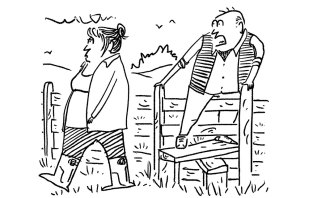There is a new dilemma for racehorse trainers. ‘What do I do?’ some of them are now worrying. ‘Do I put up signs saying, “Please don’t pee in the boxes” or “Urination forbidden at all times”?’ Such measures, they appreciate, are hardly going to attract a young couple who’ve come into money and are being shown round the yard thinking of investing in a couple of horses. But if they do not take such steps they risk facing draconian punishments. Let me explain.
Newmarket trainer Ed Dunlop, from one of the most respected families in racing, was last week given a year’s disqualification from racing by a disciplinary panel of the British Horseracing Authority because Lucidity, a filly from his La Grange yard, tested positive for cocaine after finishing second in a race at Brighton. Dunlop has never before in 30 years of training been disciplined by British authorities for a positive drug-finding and the panel attached no blame to him over the cocaine. A BHA inspection of his La Grange yard found no evidence that cocaine had ever been kept or used there and the sentence was suspended for a year. But it will be triggered if there is a second case of cocaine being found in one of his yard’s horses.
The first question here is one of basic justice. The threat hanging over Ed Dunlop for the year ahead is no small matter. Disqualification from training is excommunication. After three decades of blameless endeavour he would be labelled a danger to the sport, disgraced, barred from racecourses and from the only job he knows. If this were a Dick Francis novel, just imagine the potential blackmail threats which a discontented employee or rival could employ against him. But this is real life with real livelihoods at stake. While the disciplinary panel has made no attempt to attach any blame to Dunlop, it says it has no discretion under the rules to alter the punishment for a positive test.
Of course we all want a clean, drug-free sport but that is nonsense. Dunlop’s solicitor Rory Mac Neice has to be right when he says: ‘The rules have got to enable appropriate and fair disposal of cases and these rules don’t.’ The rules should be changed and the change made retrospective.
Next is the question of how the cocaine turned up in Lucidity’s system. Basically we don’t know. The BHA investigation found footage of a former Dunlop stable worker inappropriately touching Lucidity’s head at the races but it was inconclusive and no further investigations seem to be following.
The BHA is adamant that while there are legitimate uses for cocaine in human medicine there is none in equine medicine. Their expert told the panel: ‘Cocaine has the potential to alter the behaviour and performance of a horse, including an increase in heart-rate, blood pressure and maximum run time.’
Dunlop’s own investigations produced one staff member who admitted drug use although not at a time relevant to Lucidity’s test. More tellingly, although La Grange does have warning notices, the same person had seen staff urinating in stable boxes – and in several other drug cases that has been raised as a likely cause of cross-contamination. Stable staff are in intimate contact with the horses, and if the massage of a leading tennis player by a physio with unwashed hands after using a medicine with an anabolic steroid content has been accepted as a legitimate accidental contamination by tennis authorities, then the parallels are obvious.

We live in a society with a considerable proportion of people who indulge in recreational drug use, particularly the under-thirties. Racing is not immune. One of my favourite jump jockeys, Dean Gallagher, now a work rider playing a key role in developing City Of Troy, was banned by French authorities for cocaine use. At the very top level Frankie Dettori, Kieren Fallon and Oisin Murphy have all found themselves in trouble over cocaine use or association with those who use it, which hasn’t helped the sport with its role models. Drug pushers have been found to be particularly prevalent in areas of stable-staff concentration such as Newmarket or Lambourn.
Ed Dunlop is already working on introducing random drug-testing in his own yard and as chairman of the Newmarket Trainers Group has begun discussions on proposed random drug-testing for all those working in racing yards at any level of seniority. It comes as little surprise to discover that Mark Johnston, before he handed over training duties to his son Charlie at their Middleham Yard, had already begun random drug-testing on a quarterly basis. He admits it led to some staff leaving but, wisely, George McGrath, chief executive of the National Association of Racing Staff is now backing random tests. It seems the only way to go.







Comments